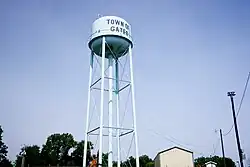Gates, Tennessee | |
|---|---|
 Water tower in Gates | |
| Nickname: Gates America | |
 Location of Gates in Lauderdale County, Tennessee. | |
| Coordinates: 35°50′21″N 89°24′25″W / 35.83917°N 89.40694°W | |
| Country | United States |
| State | Tennessee |
| County | Lauderdale |
| Area | |
| • Total | 0.70 sq mi (1.83 km2) |
| • Land | 0.70 sq mi (1.83 km2) |
| • Water | 0.00 sq mi (0.00 km2) |
| Elevation | 312 ft (95 m) |
| Population | |
| • Total | 664 |
| • Density | 941.84/sq mi (363.63/km2) |
| Time zone | UTC-6 (Central (CST)) |
| • Summer (DST) | UTC-5 (CDT) |
| ZIP code | 38037 |
| Area code | 731 |
| FIPS code | 47-28740[4] |
| GNIS feature ID | 1285236[2] |
Gates is a town in Lauderdale County, Tennessee, United States. The population was 901 at the 2000 census and 647 at the 2010 census, showing a decline of 254.
History
Gates was established around 1850 and named for Revolutionary War general Horatio Gates. The town was incorporated in 1886.[5]
Geography
Gates is located at 35°50′21″N 89°24′25″W / 35.83917°N 89.40694°W (35.839253, -89.407058).[6] The town is concentrated around the intersection of State Routes 88 and 209, south of Halls and northeast of Ripley. Memphis lies approximately 65 miles (105 km) to the southwest.
According to the United States Census Bureau, the town has a total area of 0.7 square miles (1.8 km2), all land.
Gates is situated on the southeastern edge of the New Madrid Seismic Zone, an area with a high earthquake risk.
Demographics
| Census | Pop. | Note | %± |
|---|---|---|---|
| 1890 | 204 | — | |
| 1900 | 167 | −18.1% | |
| 1910 | 292 | 74.9% | |
| 1920 | 303 | 3.8% | |
| 1930 | 314 | 3.6% | |
| 1940 | 383 | 22.0% | |
| 1950 | 234 | −38.9% | |
| 1960 | 291 | 24.4% | |
| 1970 | 523 | 79.7% | |
| 1980 | 729 | 39.4% | |
| 1990 | 608 | −16.6% | |
| 2000 | 901 | 48.2% | |
| 2010 | 647 | −28.2% | |
| 2020 | 664 | 2.6% | |
| Sources:[7][8][3] | |||
2020 census
| Race | Num. | Perc. |
|---|---|---|
| White (non-Hispanic) | 305 | 45.93% |
| Black or African American (non-Hispanic) | 318 | 47.89% |
| Native American | 2 | 0.3% |
| Other/Mixed | 30 | 4.52% |
| Hispanic or Latino | 9 | 1.36% |
As of the 2020 United States census, there were 664 people, 276 households, and 162 families residing in the town.
2000 census
As of the census[4] of 2000, there were 901 people, 266 households, and 201 families residing in the town. The population density was 1,272.5 inhabitants per square mile (491.3/km2). There were 290 housing units at an average density of 409.6 per square mile (158.1/km2). The racial makeup of the town was 45.95% White, 53.39% African American, 0.11% Native American, and 0.55% from two or more races. Hispanic or Latino of any race were 0.22% of the population.
There were 266 households, out of which 41.0% had children under the age of 18 living with them, 38.3% were married couples living together, 31.6% had a female householder with no husband present, and 24.1% were non-families. 21.4% of all households were made up of individuals, and 9.4% had someone living alone who was 65 years of age or older. The average household size was 2.79 and the average family size was 3.20.
In the town, the population was spread out, with 28.6% under the age of 18, 7.3% from 18 to 24, 22.9% from 25 to 44, 17.1% from 45 to 64, and 24.1% who were 65 years of age or older. The median age was 37 years. For every 100 females, there were 69.0 males. For every 100 females age 18 and over, there were 58.0 males.
The median income for a household in the town was $29,191, and the median income for a family was $29,653. Males had a median income of $24,615 versus $22,750 for females. The per capita income for the town was $9,910. About 26.3% of families and 26.5% of the population were below the poverty line, including 30.8% of those under age 18 and 40.6% of those age 65 or over.
Notable person
- George Taliaferro - Former professional American football player
References
- ↑ "ArcGIS REST Services Directory". United States Census Bureau. Retrieved October 15, 2022.
- 1 2 U.S. Geological Survey Geographic Names Information System: Gates, Tennessee
- 1 2 "Census Population API". United States Census Bureau. Retrieved October 15, 2022.
- 1 2 "U.S. Census website". United States Census Bureau. Retrieved January 31, 2008.
- ↑ Larry Miller, Tennessee Place Names (Indiana University Press, 2001), p. 82.
- ↑ "US Gazetteer files: 2010, 2000, and 1990". United States Census Bureau. February 12, 2011. Retrieved April 23, 2011.
- ↑ "Census of Population and Housing: Decennial Censuses". United States Census Bureau. Retrieved March 4, 2012.
- ↑ "Incorporated Places and Minor Civil Divisions Datasets: Subcounty Resident Population Estimates: April 1, 2010 to July 1, 2012". Population Estimates. U.S. Census Bureau. Archived from the original on June 11, 2013. Retrieved December 11, 2013.
- ↑ "Explore Census Data". data.census.gov. Retrieved December 8, 2021.
External links
 Media related to Gates, Tennessee at Wikimedia Commons
Media related to Gates, Tennessee at Wikimedia Commons